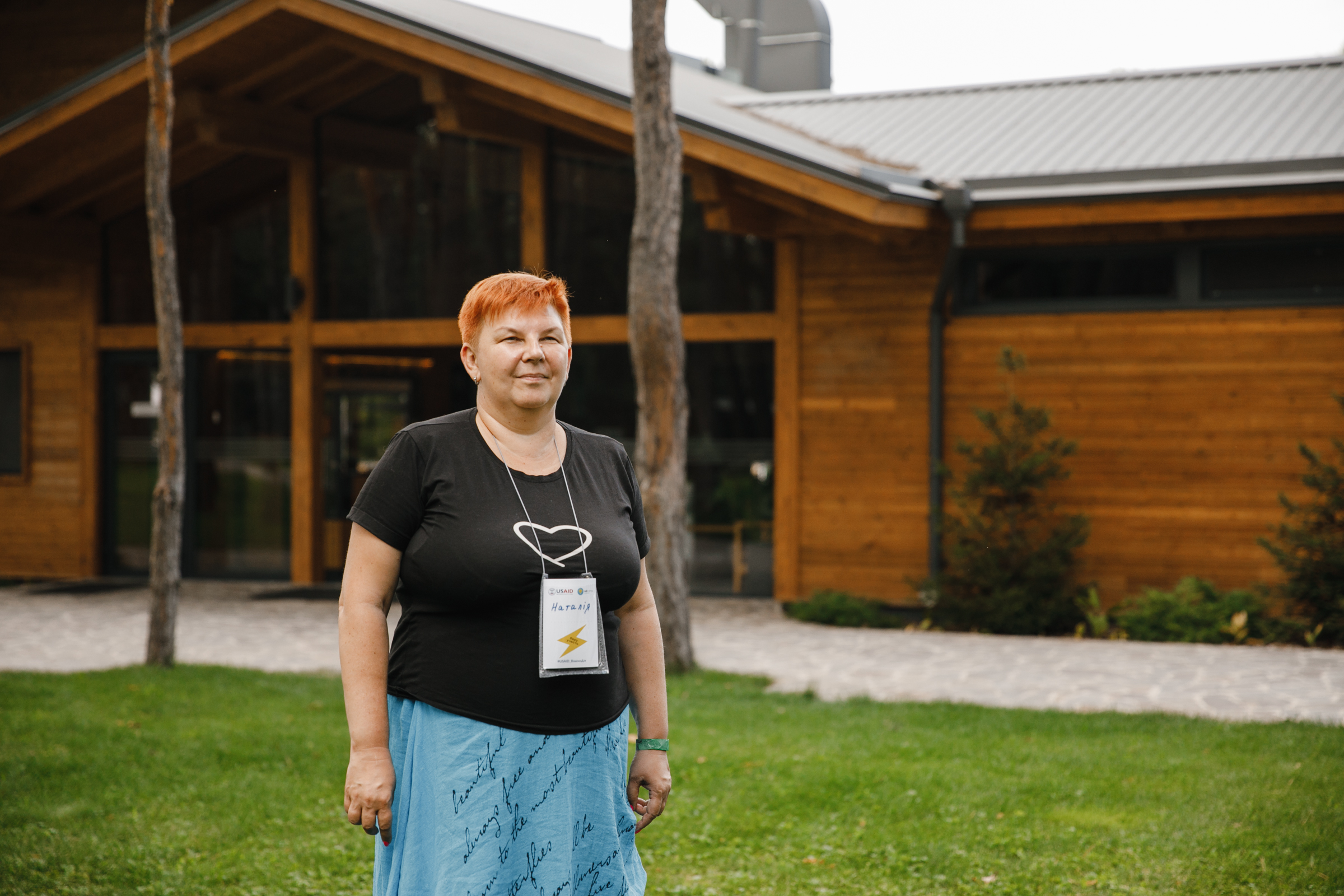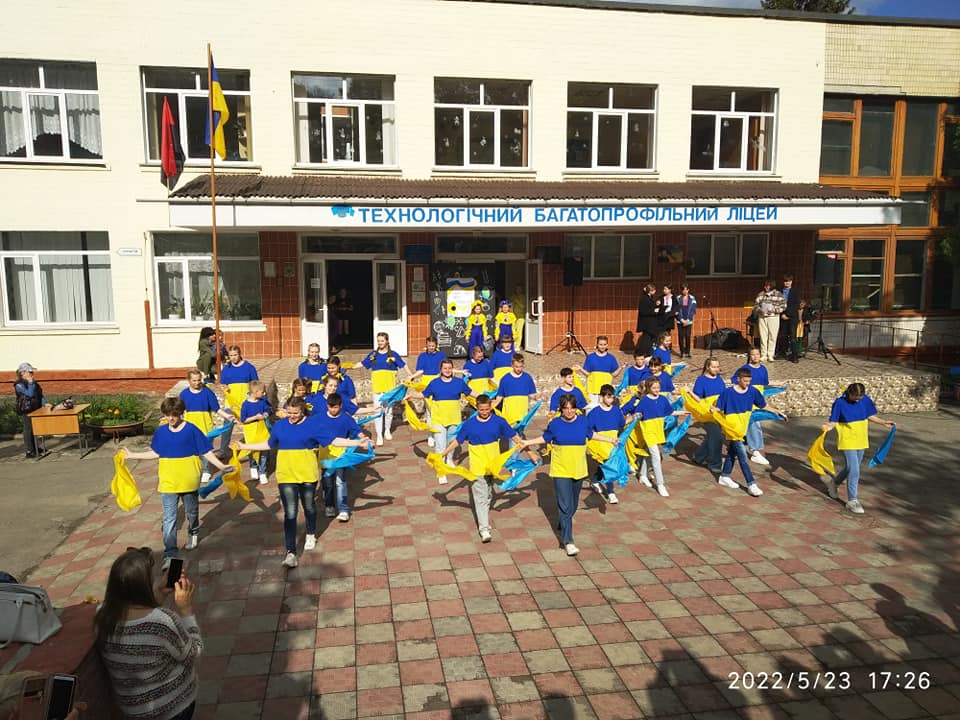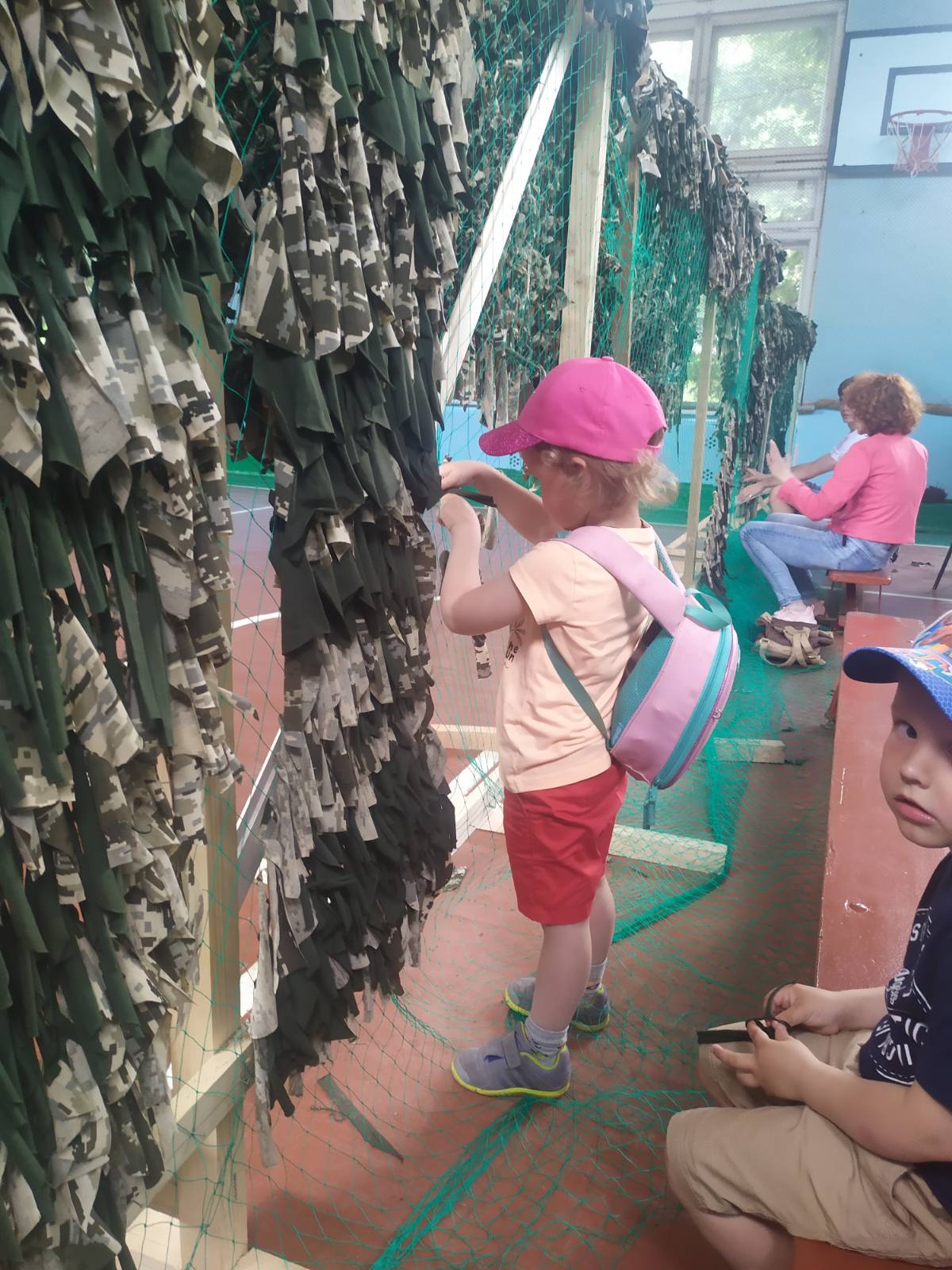Interview 9. From graphite to diamond. Nataliya Zyma
A chemistry teacher from Khmelnytskyi talks about the connection between generations, maturing of Ukrainians during the war; and why it is important to build a full-fledged national identity.
“Today, we are going through an initiation process, and we are paying a very high and bloody cost; we are becoming an adult nation. Unfortunately, it’s scary; we have huge losses. Still, I have hopes that we will become adults,” says Nataliya Zyma, a chemistry teacher from the Artem Mazur Polytechnic Lyceum in Khmelnytskyi. Nataliya observes not only the horrors of war, but also how the best in people emerges, how her students grow and mature, and how Ukrainians become hardened and united. Therefore, she underlines that, in the future, a full-fledged, not formal, national identity and critical thinking should be formed, which will prevent Ukrainians from being manipulated.
The main lessons
Hard times reveal bright people. My 25-year-old son was a typical IT nerd, a hipster who held nothing heavier than a laptop in his hands and valued his comfort above all. On the very first day of the war, he began to collect humanitarian aid, load trucks, and coordinate their dispatch. It turned out that he had the time and energy for this.
My grandfather died at the age of 101, four years ago. The war started, and I thought how good it was that he didn’t have to see it. My grandparents, born in 1918 and 1920, always had a supply of food and tried to feed me well and clothe me warmly. Now I understand that I will have the same attitude towards my grandchildren. These life lessons remain with us, and we will carry them forward.
My sister has lived in Canada for a long time. On the eve of the war, dad went to visit her and his grandson, but he couldn’t return to Ukraine – he had tickets for the beginning of March. In mid-February, he said he wanted to return, but I think it’s good that he remaine in Canada, because he lives in a very dangerous area of Ukraine. At home, dad watched Russian TV channels, and now he is very worried about Ukraine and tries to fit the current events into a global picture that he understands. When they started talking about the horrors near Kyiv, at first, he couldn’t believe what the Russians were doing. He was born in russia because his family was deported from Ukraine. I did not adopt this attitude to russia, but there are families where the younger generation thinks in terms of what their parents and grandparents have gleaned from TV. Today, it is clear how much we have underestimated the role of propaganda and manipulation.
In the future, we will have our own front — teachers and educators must cooperate to prevent this from happening again. So that Ukrainians do not feel inferior and do not undervalue themselves. Look at what a powerful nation the Ukrainians are! In peacetime, we quarreled with each other, but when real trouble came, we banded together; everyone acted as one force, and no one counted what it was costing them. It is important not to lose this and understand that unity is our strength, on which we can build the future.
The power of information
We are losing bright people who love life. Bombing civilian objects is beyond human limits. Those who do not see the value of human life are at a dead-end in their development as humans.
This is not the first time the Horde has behaved like this. Earlier, in Georgia, it was one word against another word. The word of the great and, it was believed, powerful russia and little Georgia. The rapid development of technologies and the documentation of events work towards our victory. Because if it were again one word against another word, people would not react so actively in countries that enjoy a safe and stable life.
My sister says that no one in Canada knew about the events of 2014. Now, even people who have never been interested in international news know about Ukraine and the war. This is the incredible power of information! Here, it is also essential to consider that in the USA and Canada, voters send requests to the persons they elect. And, the latest wave of support was primarily the result of such appeals from citizens. This is also important.


It is essential not to go to extremes and not to emphasize divisions, as our enemy does. Maybe we will finally learn to accept all people as they really are.

Preventing divisions
Khmelnytskyi has become a major hub for internally displaced persons. Trust in the local government and how quickly it responds to events have played a significant role. We immediately organized large centers where people could come together and help. When evacuation trains arrived en masse, our people spent days and nights in those centers, collecting needed supplies and food..
The IDPs live in local schools and kindergartens; in our school, there are 32 people, adults and children. People from Kharkiv live in my father’s house. There is absolutely no free housing left.
When there were no lessons, the children, their parents and I wove camouflage nets at the school and at the university nearby, because nets are in great demand. I live in an area with many sewing workshops. Before the war, when I took out the trash, there were always leftover fabrics in the trash cans. The war started – there was nothing; but, we use everything that we have. The biggest problem recently is finding frames for the nets; people are already learning to weave the nets on their own.
The population of Khmelnytskyi has almost doubled. People are all different, but we do not make a difference between locals and IDPs. It is essential not to go to extremes and not to emphasize divisions, as our enemy does. Maybe we will finally learn to accept all people as they really are.
Khmelnytskyi accepts enterprises that have moved from territories where there are no opportunities for work. According to the latest data, 28 enterprises have already moved to Khmelnytskyi; they are looking for production sites, and another 45 are considering the possibility of moving, not only to Khmelnytskyi, but also to smaller towns. The faster the economy works, the easier it will be to defend the country, because you can’t always rely on donations.
Enemy sources write that somewhere in Ukraine, there is a volunteer center that needs to be bombed. But they do not understand that now every apartment is a volunteer center; everyone contributes and helps as much as possible. This is our strength.
Educational front
Khmelnytskyi Region has welcomed many IDPs. According to the Khmelnytskyi State Administration, there are 6,000 children from IDP families in the region, of which about 4,000 are students. Therefore, during the first months of the war, functioning institutions accepted new students and new organizations and initiatives were opened. In particular, there is an educational hub in the regional center and numerous educational courses for high school and primary school students and parents.
In order to help Ukrainian educators continue teaching children during the war, the EdCamp Ukraine community launched a crowdfunding campaign — collecting funds for computer equipment and Internet access for teachers who lost their pedagogical equipment in the war. The funds will be used for psychological support for teachers and to organize conferences where they can share their pedagogical experiences during the war. Both foreign colleagues – on the GoFundMe platform, and Ukrainians – on the EdCamp Ukraine page, can join the campaign by adding the comment My War. Lessons to the payment.
Patriotic education
Our children have behaved fantastically. In the first days of the war, everyone was in shock and scared. We didn’t have lessons with the kids, but we chatted with them and their parents, tried to talk about music and movies and exchanged memes. But, something else worked. One boy suggested getting together and preparing Molotov cocktails. The other children warmly supported him. I was surprised – never before had they really wanted to study chemistry.
I have always complained about educational work in our schools. It was formalized and, as I saw it, ineffective. But, it turned out that this was not true. I teach grade 5-11 students, and from the first day, not a single child said that Ukraine was not strong and would not win. Even the fifth-graders were confident of victory, despite their fear. There were even cases when the children stayed up all night because they were afraid to sleep through an air raid alert.
On March 9, we had the first lesson and immediately planned what to do after our victory. Before that, children dreamed of new phones, but now they have forgotten about material things and focus more about people. Our children have grandiose plans – for example, the internally displaced kids want to return to their hometown and meet with others. I am the homeroom teacher of the 9th grade. Before the war, my students said that they would travel somewhere else to study and work. Today, they want to stay in their native Khmelnytskyi, their native school. Our children have become adults. Earlier they used to speak more russian or surzhyk, but today they write in Ukrainian. They are very humane, which makes me very proud.
A russian-speaking girl from Chernihiv is currently studying with us. I was worried that the child would be offended in the chats. But no – everything turned out well. It is difficult for her, but no one comments, and she tries to write in Ukrainian. War is terrible; we pay a tremendously high and bloody price, and at the same time, we discover something new, pure, something that inspires hope.


As a chemistry teacher, I can give the following comparison: from ordinary graphite, which is used in pencils, a diamond crystallizes in the fire – it becomes hard, transparent, and strong. So are we, Ukrainians. In difficult, brutal times, we have discovered that we are stronger than we thought.

Reviewing the routine
There are many changes in the educational process. Children who are now in different places and in different countries study with us. We have a lot of IDP children from Kharkiv, Chernihiv, and Kherson. There are even children who have sent applications to our schools, but live somewhere in the occupied territories. There are such children. It is clear that everyone is in a different situation; they have different opportunities.
Another change is the air raid alerts. We have changed the lesson schedule because, of course, we cannot force a child who has not slept all night to study. We start classes later; we have breaks. At the pedagogical council, we decided that if the alerts and shelling are very intense, we will work in asynchronous mode and give our students less work.
We also do not impose strict deadlines. Because even the children who are currently abroad often do not have access to the Internet. We in Ukraine are spoiled by cheap and fast internet, while our children abroad have to deal with expensive connections, low speed, and limited access.
Subject competencies have receded into the background. I have removed some topics, for example, nitro compounds, which mainly include explosives.
The EdCamp Academy was very helpful when I began preparing lessons, hoping to make them exciting and focused. It helped me to look at my usual lesson routine in a new way and shift my focus to something else. In my regular lessons, I try to include subjective things about chemistry and reduce the number of formulas and calculations. It helps a lot in grades 8-9. Of course, experience comes in handy — I understand the structure of the entire study course and where it can be done.
Acting like a confident adult
My students have become a source of strength, because learning and teaching have helped me pull myself together. When I see my children, I have to act like a confident adult who knows what she’s doing. Sometimes my mood fluctuates, and I don’t want to go online, but I then think – no, I must pull myself together. I never believed the advice from psychologists – smile in front of the mirror, but now I know it works and helps you feel more responsible.
When we go online, we use exercises to relieve psychological stress. It was strange at first because chemistry classes are considered somewhat dry and boring. But now, at the end of the lesson, we get together and talk. Teachers need to be ready for this. You can’t ignore the conversation, because you must support the children as much as possible.
You always want to do more. So, my colleagues and I created the Dopamine Club, where we give children different exercises – draw something, make a collage, solve a crossword puzzle – to distract them. We thought the children would not participate, but they love this club, because it stimulates them.
Community sustainability
This year, we planned to hold an EdCamp and intuitively chose the topic of sustainability practices. It is clear that everything will be different after our victory – these will be actual practices of Ukrainian resilience. Children have always been involved in our conferences; for them, these events have become even more important than for teachers. We want it to be an event about us, our experiences, practices and dreams.
I once thought that I was a lone wolf, could only work alone, and was not at all a team player, so clubs were not for me. In recent years, I’ve learned how important communities are. In the Ukrainian tradition, with its community work (toloka) and mutual assistance, there has always been a good understanding of the power of a community. Now I am ready to be in any kind of club – cat lovers, embroidery fans, and all sorts of things.
Identity and critical thinking
In the last 50 years, education has been searching for development options and new opportunities. But, I think it’s important to focus on things that are beyond defined school subjects, on the balance between global citizenship and national identity. The word “patriotism” does not always have a clear meaning, but it is vital for any nation to have and develop a national identity. We are all different; we have our own peculiarities.
It is important not to run after visual things like the vyshyvanka (embroidered shirt), but to build an identity in terms of values and culture. Our children have begun to read the Kobzar and works of Ukrainian writers with an entirely different understanding. We need to explore our culture informally. See how Chervona Kalyna (a song about the red viburnum) sounds now, how children have become more interested in history. It should become part of life.
Regardless of the country and educational system, it is also very important to initiate critical thinking and teach children to analyze, look for evidence, and give their own arguments, not just slogans. It is also difficult for us adults, but it must be taught. Critical thinking provides an understanding of the value of learning, development, science and ecology. Critical thinking and national identity are two cornerstones on which our future education must be built.
Text — Halyna Kovalchuk.
The interview series My War. The Lessons was prepared with financial support from the Black Sea Trust for Regional Cooperation – a project of the German Marshall Fund of the United States.
The views and opinions expressed are those of the author and do not necessarily reflect the official policy or position of EdCamp Ukraine and the Foundation.











